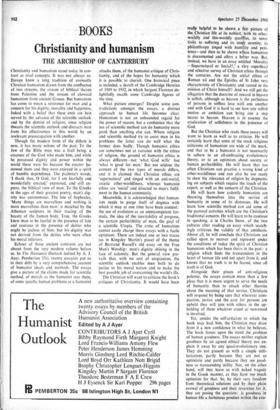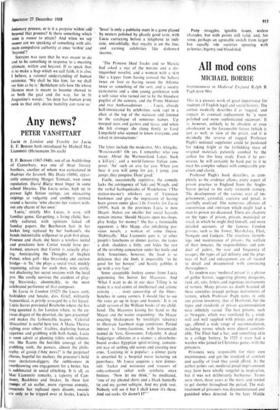Christianity and humanism BOOKS
THE ARCHBISHOP OF CANTERBURY
Christianity and humanism stand today in con- trast as rival concepts. It was not always so. Europe knew a long tradition of avowedly Christian humanism drawn from the confluence of two streams, the stream of biblical theism from Palestine and the stream of classical humanism from ancient Greece. But humanism has come to mean a reverence for man and concern for his dignity, morality and happiness, linked with a belief that these ends are best served by the advance of the scientific outlook and by the demise of religion, since religion thwarts the scientific outlook and distracts man from his effectiveness in this world by an irrelevant preoccupation with another.
Though the modern form of the debate is new, it has many echoes of the past. To the Jew of the Bible man was a frail being, a creature of the God who made him, and while he possessed dignity and power within the world these were his because the creator be- stowed them and they were enjoyed in a spirit of humble dependence. The psalmist's words, 'I thank thee, 0 God, for I am fearfully and wonderfully created,' expressed, and still ex- press, the biblical view of man. To the Greeks in the ages of their greatest poetry, man's dig- nity was autonomous. The line of Sophocles, 'Many things are marvellous and nothing is more marvellous than man,' is matched by the Athenian sculptors in their tracing of the beauty of the human body. True, the Greeks knew man to be fearful in the presence of fate and cautious in the presence of deities who might be jealous of him; but his dignity was not derived from the deities who were often his moral inferiors.
Echoes of those ancient contrasts are not absent from the very modern volume before us. In The Humanist Outlook (edited by A. J. Ayer, Pemberton 35s), twenty essayists put us in their debt by a very comprehensive account of humanist ideals and methods. The essays give a picture of the claims made for scientific method, of morals as the humanist sees them, of some specific human problems as a humanist attacks them, of the humanist critique of Chris- tianity, and of the hopes for humanity which it is possible to cherish. One historical piece is included, a sketch of the Cambridge Heretics of 1909 to 1932, in which Sargant Florence de- lightfully recalls some Cambridge figures of the time.
What picture emerges? Despite some con- tradictions amongst the essays, a distinct approach to human life becomes clear. Humanism is not an unbounded regard for the power of reason, but a confidence that the use of scientific method can do humanity more good than anything else can. Where religion and scientific method try to assist man in his problems the latter can do well what the former does badly. Though humanist ethics are sometimes not at variance with the ethics of religion, the ground of humanist ethics is always different—not 'what God wills' but 'what is good for man.' But not seldom the content of the two types of morals differs, and it is claimed that Christian ethics are 'supernatural' and tinged with an anti-social, ascetic other-worldliness, whereas humanist ethics are 'social' and directed to man's fulfil- ment in the human community.
Meanwhile, it is acknowledged that human- ism needs to purge itself of dogmas with which it may at one time have been content: the use of evolution as an omnicompetent for- mula, the idea of the inevitability of progress, the certain perfectibility of man, the goal of a scientific Utopia. The critic of humanism cannot easily charge these essays with a facile optimism. There are indeed one or two traces (as in Kingsley Martin's piece) of the theme of Bertrand Russell's old essay on the Free Man's Worship: man's dignity shining in the face of calamity. But the general view pre- vails that, with no sort of utopianism, the scientific outlook enables man both to do justice to his moral nature and to make the best possible job of overcoming the world's ills.
The Christian will want to criticise the book's critiques of Christianity. It would have been
really helpful to be shewn a fair picture of the Christian life at its noblest, with its other- worldly and this-worldly quahtes, its sensi- tivity to suffering and its inner serenity, its philanthropy tinged with humility and peni- tence—and then to be shewn where humanism is discontented and offers a better way. But, instead, we have in an essay entitled 'Morality —Supernatural or Social?,' a vbry superficial and selective survey of Christian ethics through the centuries. Are not the social ethics of Roman xii and the Epistles of St John very characteristic of Christianity and rooted in the mission of Christ himself? And we still get the allegation that the doctrine of reward in heAven is selfish, although as heaven is the perfection of persons in selfless love with one another and with God it is hard to see how any selfish motive or ambition can bring one a step nearer to heaven. Heaven is in essence the eradication of selfishness in the presence of God.
But the Christian who reads these essays will want to learn as well as to criticise. He will certainly learn that some of the stock religious criticisms of humanism are wide of the mark, and that to be a humanist is not necessarily to adhere to an all-embracing evolutionary theory, or to an optimism about society or human perfectibility. He will learn that too often Christians can practise a wrong kind of other-worldliness and can also be too ready to shew the relevance of religion by dogmatis- ing on subjects which require the touch of the expert, as well as the concern of the Christian.
He will learn how ardently humanists are throwing themselves into the service of humanity in some of its distresses. He will learn how scientific method can aid some of the pastoral activities which are the Christian's traditional concern. He will learn to be cautious in speaking, a la Charles Snow, of the two cultures after reading an essay which search- ingly criticises the validity of that antithesis. Above all, he will conclude that Christians are called upon to recover and represent under the conditions of today the spirit of Christian humanism which has been theirs in the past: a religion which finds the transcendent in the heart of human life and not apart from it, and knows that no truth is to be feared, since all truth is of God.
Alongside their pieces of anti-religious polemic, the essays contain more than a few pleas that it is more urgent to serve the needs of humanity than to attack other theories about the meaning of that service. Christians will respond by being sure that wherever com- passion, justice and the care for persons are upheld they will join with others in the up- holding of them whatever creed or non-creed is involved.
Yet, amidst the self-criticism to which the book may lead him, the Christian may draw from it a new confidence in what he believes. The book forces upon the mind the problem of human goodness. The essays neither explain goodness by an agreed ethical theory nor ex- plain it away by any quasi-evolutionary one. They do not present us with a simple utili- tarianism, partly because they are not so optimistic and partly because they see good- ness as transcending utility. Nor, on the other hand, will they leave us with naked tragedy in the Greek manner, as they have too much optimism for that. So, by their very freedom from theoretical solutions and by their plain avowal of goodness and .their reverence for it, they are posing the question: is goodness in human life a fortuitous product within the evo- 4ationary process, or is it a purpeie Within arta' beyond that process? Is there something which ' man is meant to attain? And when we say meant are we speaking of something with ulti- mate compulsive authority at once 'within' and ' 'beyond'?
Socrates was sure that he was meant to do and to be something in response to a meaning ultimate, within and beyond. If to speak thus is to make a leap which we call faith, it is also; I believe, a rational understanding of human existence. 'We shall be like him, for we shall see him as he is.' Bethlehem tells how He whose likeness man is meant to become shewed to us both the goal and the way, for in St Augustine's words: 'So deep has human pride sunk us that only divine humility can raise us.'



































 Previous page
Previous page